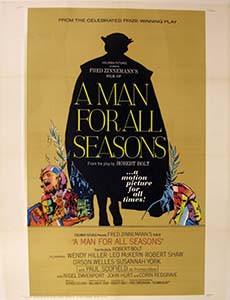*/

Scripted by Robert Bolt from his play of the same name and directed by Fred Zinnemann (not in this instance by David Lean), A Man for All Seasons depicts the final years of Sir Thomas More, Lord Chancellor of Britain and quintessential man of integrity and letters.
A lawyer of great conscience, as most will (or should) know, he refused to sign a letter asking Pope Clement VIII to annul the marriage of Catherine of Aragon to Henry VIII and recognise the King by way of an oath of supremacy as Head of the Church of England. The only member of the Privy Council to oppose Wolsey’s (played here by Orson Welles) attempts to obtain an annulment from the Pope, on Wolsey’s death and promotion to Lord Chancellor More continues to resist the King (Robert Shaw) and his threats, tantrums and promises of royal favour. Richard Rich (John Hurt) and Thomas Cromwell (Leo McKern) plot to bring More down.
More is played impeccably by one of the more intermittent of the great screen and stage actors England has produced, Paul Scofield. Many were reluctant to give him the part. How wrong they were; the film scored six Academy Awards including Best Picture, Best Director and Best Actor for Scofield.
Integrity is of the ages and the film’s lessons are profound for our time. A Lord Chancellor acting with principle and integrity, a steadfast man of the law and a gatekeeper of the system. The sense of conscientious objection, the drawing of lines and markers of principle when ‘enough is enough’ – ultimately, at the cost of his head after a corrupt trial.
It is vitally important within any corrosive establishment to preserve those who Just Say No. There are other examples, notable for their rarity. Erwin Rommel, when he ultimately supported the plot against Hitler, is analogous. Rommel suffered a more private execution; a pill in the back of a car.
In a sense, More subscribed to the Bingham Principle of being an independent executive officer. The system breaks down when those who are the gatekeepers no longer uphold the law. It is an increasingly important issue for lawyers in high office at the present time to maintain a modicum of integrity, principle and moderation within office.
Now, acting on principle should not be confused with self-immolation or martyrdom. To walk away and live to fight another day is most often the prudent course of action. Ideally, establish the point vigorously then disassociate before it is too late. If you can. Many, such as More or Rommel, become trapped in an ever-worsening establishment and often fail to fully appreciate the gravity of matters when decency and honour no longer apply. They become victims of principle. By being principled.
The crucial modern text in respect of principle and moderation is, in my view, by the greatest man of letters of the 20th century. It is Camus’ The Rebel (1951). The rebel only in that he or she believes in form, rationality, argumentation, secular or Christian humanism and that odd word ‘decency’. In a world of severe threats to the cause of human rights moderation is needed to protect the vulnerable, whoever they are and wherever they come from.
More wrote, of course, an anti-dystopian text Utopia (1516) which is now part of the moderation of the anti-transhumanist zeitgeist. The voice in the wilderness. Well, what is wrong with peace, love, understanding and a measure of social democracy and/or integrity? That is the lesson of A Man for All Seasons. And as we unite in mourning of another person of conscience, principle and reason, Her Majesty Queen Elizabeth II, we are reminded to be more (not less) than your office – as she was.


Scripted by Robert Bolt from his play of the same name and directed by Fred Zinnemann (not in this instance by David Lean), A Man for All Seasons depicts the final years of Sir Thomas More, Lord Chancellor of Britain and quintessential man of integrity and letters.
A lawyer of great conscience, as most will (or should) know, he refused to sign a letter asking Pope Clement VIII to annul the marriage of Catherine of Aragon to Henry VIII and recognise the King by way of an oath of supremacy as Head of the Church of England. The only member of the Privy Council to oppose Wolsey’s (played here by Orson Welles) attempts to obtain an annulment from the Pope, on Wolsey’s death and promotion to Lord Chancellor More continues to resist the King (Robert Shaw) and his threats, tantrums and promises of royal favour. Richard Rich (John Hurt) and Thomas Cromwell (Leo McKern) plot to bring More down.
More is played impeccably by one of the more intermittent of the great screen and stage actors England has produced, Paul Scofield. Many were reluctant to give him the part. How wrong they were; the film scored six Academy Awards including Best Picture, Best Director and Best Actor for Scofield.
Integrity is of the ages and the film’s lessons are profound for our time. A Lord Chancellor acting with principle and integrity, a steadfast man of the law and a gatekeeper of the system. The sense of conscientious objection, the drawing of lines and markers of principle when ‘enough is enough’ – ultimately, at the cost of his head after a corrupt trial.
It is vitally important within any corrosive establishment to preserve those who Just Say No. There are other examples, notable for their rarity. Erwin Rommel, when he ultimately supported the plot against Hitler, is analogous. Rommel suffered a more private execution; a pill in the back of a car.
In a sense, More subscribed to the Bingham Principle of being an independent executive officer. The system breaks down when those who are the gatekeepers no longer uphold the law. It is an increasingly important issue for lawyers in high office at the present time to maintain a modicum of integrity, principle and moderation within office.
Now, acting on principle should not be confused with self-immolation or martyrdom. To walk away and live to fight another day is most often the prudent course of action. Ideally, establish the point vigorously then disassociate before it is too late. If you can. Many, such as More or Rommel, become trapped in an ever-worsening establishment and often fail to fully appreciate the gravity of matters when decency and honour no longer apply. They become victims of principle. By being principled.
The crucial modern text in respect of principle and moderation is, in my view, by the greatest man of letters of the 20th century. It is Camus’ The Rebel (1951). The rebel only in that he or she believes in form, rationality, argumentation, secular or Christian humanism and that odd word ‘decency’. In a world of severe threats to the cause of human rights moderation is needed to protect the vulnerable, whoever they are and wherever they come from.
More wrote, of course, an anti-dystopian text Utopia (1516) which is now part of the moderation of the anti-transhumanist zeitgeist. The voice in the wilderness. Well, what is wrong with peace, love, understanding and a measure of social democracy and/or integrity? That is the lesson of A Man for All Seasons. And as we unite in mourning of another person of conscience, principle and reason, Her Majesty Queen Elizabeth II, we are reminded to be more (not less) than your office – as she was.



The Bar Council is ready to support a turn to the efficiencies that will make a difference
By Louise Crush of Westgate Wealth Management
Marie Law, Director of Toxicology at AlphaBiolabs, examines the latest ONS data on drug misuse and its implications for toxicology testing in family law cases
An interview with Rob Wagg, CEO of New Park Court Chambers
What meaningful steps can you take in 2026 to advance your legal career? asks Thomas Cowan of St Pauls Chambers
Marie Law, Director of Toxicology at AlphaBiolabs, explains why drugs may appear in test results, despite the donor denying use of them
Ever wondered what a pupillage is like at the CPS? This Q and A provides an insight into the training, experience and next steps
The appointments of 96 new King’s Counsel (also known as silk) are announced today
Ready for the new way to do tax returns? David Southern KC continues his series explaining the impact on barristers. In part 2, a worked example shows the specific practicalities of adapting to the new system
Resolution of the criminal justice crisis does not lie in reheating old ideas that have been roundly rejected before, say Ed Vickers KC, Faras Baloch and Katie Bacon
With pupillage application season under way, Laura Wright reflects on her route to ‘tech barrister’ and offers advice for those aiming at a career at the Bar